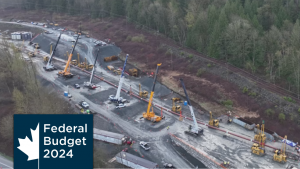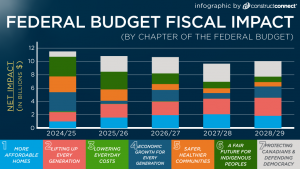Construction stakeholders are welcoming the Justin Trudeau government’s new $10-billion Canada Infrastructure Bank (CIB) Growth Plan, with praise for the green building focus tempered in some cases by disappointment that traditional construction sectors were left out.
The growth plan announced Oct. 1 “is a promising step towards securing jobs and boosting economic growth through infrastructure investment,” said Canadian Construction Association (CCA) president Mary Van Buren in a statement. “In order for the plan to have the intended impact, there must be urgency in tendering the projects and a swift flow of funds.”
“It is a strong signal about our government’s intention to spend money on infrastructure which will help our industry and also many other industries related to construction because of the economic multiplier that construction gives to the rest of the economy,” said Sean Strickland, executive director of Canada’s Building Trades Unions.
The announcement, hosted by Minister of Infrastructure and Communities Catherine McKenna and CIB chair Michael Sabia, indicated the spending would be spread over three years and was expected to create 60,000 jobs as part of what stakeholders identified as a government “tilt” to green infrastructure.
A total of $2.5 billion will be spent on clean power to support renewable generation and storage and to transmit clean electricity, the government stated; $2 billion will be spent on large-scale building retrofits to increase energy efficiency; $2 billion will be allocated to broadband infrastructure; $1.5 billion will be targeted for agriculture irrigation projects; and $1.5 billion will be spent to boost the adoption of zero-emission buses and charging infrastructure.
The CIB will also allocate $500 million to accelerate growth plan projects and undertake early works on its projects.
The spending should be considered part of a suite of infrastructure programs, commented Association of Consulting Engineering Companies — Canada president and CEO John Gamble, including the government’s signature $180-billion Investing in Canada plan, and so the fact that there are no heavy civil projects, for example, should not be a cause for alarm at this time. The $10 billion in the growth plan comes from $35 billion earmarked for the CIB and represents a significant step in carving out a new role for the underutilized agency, he suggested.
“My advice to the government is, we have no problem with some of those projects they are showcasing and want to emphasize,” Gamble said. “But there are lots of other kinds of projects that are not expressly listed here. Our presumption is that those kinds of projects will still get some support from existing and perhaps future programs.
“Our counsel to the government is that they don’t wait on those because those are what give us the economic capacity to do other things.”
Similarly, the Residential and Civil Construction Alliance of Ontario (RCCAO) issued a statement that it’s “generally pleased with the $10 billion earmarked for new major initiatives, but is calling for more focused investment on state-of-good repair projects which are required in almost every community across Canada.”
The spending in the growth plan is not helping in the “here and now,” said RCCAO executive director Andy Manahan.
“Municipalities are in a tough bind,” he said. “Contractors are relatively busy right now but we will be releasing a survey…saying the number of tenders has dropped off significantly, and also larger contractors are now bidding on smaller jobs they normally would not. So there are telltale signs the construction sector is hurting.”
The CCA also noted the absence of “essential” sectors of infrastructure, and added, “Regions hard hit by the downturn in oil and gas also appear to be left out of the plan. We hope these oversights will be addressed.”
Progressive Contractors Association of Canada vice-president of public affairs Darrel Reid argued the funding was merely “repurposed” and said the involvement of the CIB raised “larger questions about where the bank is heading.”
“Our members are going to be actively seeking this work,” he said. “We are supporting the government here.
“The challenge is getting actual projects going.”
Reid differed with Strickland over how bidding should be handled on projects funded by the growth fund. Strickland said, “It is important that those projects come with community benefits agreements so we can further value by creating jobs for racialized Canadians and women and underrepresented groups.”
Reid said his association wants to see the projects bring the best value for taxpayers with transparent bidding.
“We are not entirely enthusiastic, in the sense that we have moved from shovel-ready projects, shovels in the ground, to an emphasis on public welfare,” said Reid.
Among other statements released:
- “This acceleration shows that the government is already following through on throne speech commitments. Our members want us…to ensure the government keeps its word and gets money flowing to qualified projects quickly.” — Tania Johnston, CEO, Mechanical Contractors Association of Canada.
- “Today’s announcement from the Canadian Infrastructure Bank is a significant and bold step towards Canada’s low-carbon future and a strong follow-up to last week’s throne speech. This investment has the power to kickstart the green economy and meaningfully lower carbon emissions.” — Thomas Mueller, president, Canada Green Building Council.
- “Retrofitting is not just good for business, it will help to reduce the proportion of greenhouse gas emissions from the built environment, conserve water, and make places healthier and more comfortable to live and work in.” — Ralph Suppa, president, Canadian Institute of Plumbing and Heating.
Follow the author on Twitter @DonWall_DCN.











Recent Comments
comments for this post are closed